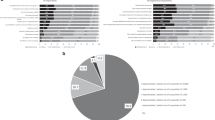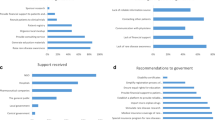Abstract
Background
Conducting of clinical trials for rare diseases faces multiple challenges. Patients’ cognition and attitude toward clinical trials are crucial, which may affect their participation and compliance, and affect the schedule of clinical trials eventually.
Objective and Method
This study aims to explore the knowledge and attitudes of clinical trials of patients with rare diseases or patients’ guardians. An anonymous cross-sectional survey was conducted from November 1, 2021, to November 30, 2021. A total of 1131 valid questionnaires were included. Among them, 417 were filled in by the patients themselves, and 714 were answered by the patients’ guardians.
Results
The average score of clinical trial knowledge of the patients (8.25) was lower than that of the guardians (8.85). The willingness of the patients to participate in clinical trials was high (4.28), and the willingness of the patients’ guardians was also high for patients to participate in clinical trials (4.35). The main promoting factors of clinical trial participation were the possibility of curing the disease. The main hindering factors of participation in clinical trials were lack of access to clinical trial information and concern about the safety and effectiveness of the trial drug.
Conclusions
In conclusion, most respondents had some basic knowledge of clinical trials and high willingness to participate in clinical trials. But there were some cognitive deficiencies about clinical trials and many hindering factors to participate in clinical trials. Clinical trials of rare diseases should be patient-centered and truly meet the unmet clinical, psychological, and social needs of patients with rare diseases.

Similar content being viewed by others
References
Aartsma-Rus A, Dooms M, Le Cam Y, Od Expert G, Copenhagen E. Orphan medicine incentives: how to address the unmet needs of rare disease patients by optimizing the European orphan medicinal product landscape guiding principles and policy proposals by the European Expert Group for Orphan Drug Incentives (OD Expert Group). Front Pharmacol. 2021. https://doi.org/10.3389/fphar.2021.744532
McCray AT, LeBlanc K, Undiagnosed DN. Patients as partners in rare disease diagnosis and research. Yale J Biol Med. 2021;94(4):687–92.
Wakap SN, Lambert DM, Olry A, et al. Estimating cumulative point prevalence of rare diseases: analysis of the Orphanet database. Eur J Hum Genet. 2020;28(2):165–173. https://doi.org/10.1038/s41431-019-0508-0.
He JJ, Song PP, Kang Q, et al. Overview on social security system of rare diseases in China. Biosci Trends. 2019;13(4):314–23. https://doi.org/10.5582/bst.2019.01209.
Liu P, Gong MC, Li J, et al. Innovation in informatics to improve clinical care and drug accessibility for rare diseases in China. Front Pharmacol. 2021. https://doi.org/10.3389/fphar.2021.719415.
Patel S, Miller Needleman KI. FDA’s Office of Orphan Products Development: providing incentives to promote the development of products for rare diseases. J Pharmacokinet Pharmacodyn. 2019;46(5):387–393. https://doi.org/10.1007/s10928-019-09645-4.
Xiang Z, Jiang W, Yan B, Jiang J, Zheng H. Current status and trend of clinical development of orphan drugs in China. Orphanet J Rare Dis. 2022;17(1):294. https://doi.org/10.1186/s13023-022-02440-4.
Fonseca DA, Amaral I, Pinto AC, Cotrim MD. Orphan drugs: major development challenges at the clinical stage. Drug Discovery Today. 2019;24(3):867–872. https://doi.org/10.1016/j.drudis.2019.01.005.
Kempf L, Goldsmith JC, Temple R. Challenges of developing and conducting clinical trials in rare disorders. Am J Med Genet A. 2018;176(4):773–783. https://doi.org/10.1002/ajmg.a.38413.
Bell SA, Tudur SC. A comparison of interventional clinical trials in rare versus non-rare diseases: an analysis of ClinicalTrials.gov. Orphanet J Rare Dis. 2014;9(1):170. https://doi.org/10.1186/s13023-014-0170-0.
Chu SH, Jeong SH, Kim EJ, et al. The views of patients and healthy volunteers on participation in clinical trials: An exploratory survey study. Contemp Clin Trials. 2012;33(4):611–619. https://doi.org/10.1016/j.cct.2012.02.018.
Center For Drug Evaluation. Notice on Issuing the "Technical Guidelines for Clinical Research and Development of Drugs for Rare Diseases". January 6, 2022 (in Chinese). https://www.cde.org.cn/main/news/viewInfoCommon/c4e1ef312a0a0c039a7a4ca55b91d4e8 (Accessed September 1, 2022).
Gobburu J, Pastoor D. Drugs against rare diseases: are the regulatory standards higher? Clin Pharmacol Ther. 2016;100(4):322–3. https://doi.org/10.1002/cpt.415.
Huang R, Rao HY, Lv FF, et al. Attitudes of Chinese patients with non-alcoholic fatty liver disease toward participation in clinical trials from a national multicenter survey. Ther Innov Regul Sci. 2022;56(3):464–73. https://doi.org/10.1007/s43441-022-00380-6.
Karampatakis D, Kakavouti-Doudos A, Oikonomidis P, Voultsos P. Translation and validation of the greek version of a questionnaire measuring patient views on participation in clinical trials. Bmc Health Serv Res. 2021;21(1)1135. https://doi.org/10.1186/s12913-021-07111-x
Detoc M, Gagneux-Brunon A, Lucht F, Botelho-Nevers E. Barriers and motivations to volunteers’ participation in preventive vaccine trials: a systematic review. Expert Rev Vaccines. 2017;16(5):467–77. https://doi.org/10.1080/14760584.2017.1297706.
Medic B, Divac N, Stopic B, et al. The attitudes of medical students towards rare diseases: A cross-sectional study. Vojnosanit Pregl. 2016;73(8):703–13. https://doi.org/10.2298/vsp150326094m.
Ito-Ihara T, Hong JH, Kim OJ, et al. An international survey of physicians regarding clinical trials: a comparison between Kyoto University Hospital and Seoul National University Hospital. Bmc Med Res Methodol. 2013. https://doi.org/10.1186/1471-2288-13-130
Ramirez AG, Wildes K, Talavera G, Napoles-Springer A, Gallion K, Perez-Stable EJ. Clinical trials attitudes and practices of Latino physicians. Contemp Clin Trials. 2008;29(4):482–92. https://doi.org/10.1016/j.cct.2007.11.001.
He J, Tang M, Zhang X, et al. Incidence and prevalence of 121 rare diseases in China: Current status and challenges. Intractable Rare Dis Res. 2019;8(2):89–97. https://doi.org/10.5582/irdr.2019.01066.
Sharma NS. Patient centric approach for clinical trials: Current trend and new opportunities. Perspect Clin Res. 2015;6(3):134–8. https://doi.org/10.4103/2229-3485.159936.
Lamberti MJ, Awatin J. Mapping the landscape of patient-centric activities within clinical research. Clin Ther. 2017;39(11):2196–202. https://doi.org/10.1016/j.clinthera.2017.09.010.
Winter E, Schliebner S. Current advances in clinical trials for rare disease populations: spotlight on the patient. Curr Rev Clin Exp Pharmacol. 2022;17(1):39–45. https://doi.org/10.2174/1574884716666210316120615.
Center For Drug Evaluation. Notice on public solicitation of comments on the “guiding principles for general considerations of organizing patients to participate in drug research and development (Exposure Draft)”. July, 6, 2022 (in Chinese). https://www.cde.org.cn/main/news/viewInfoCommon/2981a587ba89aa3368130ac1565fb04f (Accessed September 1, 2022).
Epps C, Bax R, Croker A, et al. Global regulatory and public health initiatives to advance pediatric drug development for rare diseases. Ther Innov Regul Sci. 2022. https://doi.org/10.1007/s43441-022-00409-w.
Gainotti S, Turner C, Woods S, et al. Improving the informed consent process in international collaborative rare disease research: effective consent for effective research. Eur J Hum Genet. 2016;24(9):1248–54. https://doi.org/10.1038/ejhg.2016.2.
Kacetl J, Marešová P, Maskuriy R, Selamat A. <p>Ethical Questions Linked to Rare Diseases and Orphan Drugs – A Systematic Review</p>. Risk Manage Healthcare Policy. 2020;13:2125–48. https://doi.org/10.2147/rmhp.s260641.
Prodinger C, Diem A, Ude-Schoder K, et al. Profiling trial burden and patients’ attitudes to improve clinical research in epidermolysis bullosa. Orphanet J Rare Dis. 2020. https://doi.org/10.1186/s13023-020-01443-3.
Morel T, Ayme S, Cassiman D, Simoens S, Morgan M, Vandebroek M. Quantifying benefit-risk preferences for new medicines in rare disease patients and caregivers. Orphanet J Rare Dis. 2016. https://doi.org/10.1186/s13023-016-0444-9.
Peay HL, Biesecker B, Wilfond BS, et al. Barriers and facilitators to clinical trial participation among parents of children with pediatric neuromuscular disorders. Clin Trials. 2018;15:139.
Zolkipli-Cunningham Z, Xiao R, Stoddart A, et al. Mitochondrial disease patient motivations and barriers to participate in clinical trials. PLoS ONE. 2018;13(5):e0197513.
Huang R, Wei Y, Hu J, et al. The progress of, challenges faced by, and future of rare disease patient organizations in China. Intractable Rare Dis Res. 2019;8(2):158–60. https://doi.org/10.5582/irdr.2019.01069.
Li XF, Lu ZJ, Zhang JY, et al. The urgent need to empower rare disease organizations in China: an interview-based study. Orphanet J Rare Dis. 2020;15(1)282. doi:https://doi.org/10.1186/s13023-020-01568-5
Lopez E, Thompson R, Gainotti S, et al. Overview of existing initiatives to develop and improve access and data sharing in rare disease registries and biobanks worldwide. Expert Opin Orphan Drugs. 2016;4(7):729–39. https://doi.org/10.1080/21678707.2016.1188002.
Pietrzykowski T, Smilowska K. The reality of informed consent: empirical studies on patient comprehension-systematic review. Trials. 2021;22(1)57. doi:https://doi.org/10.1186/s13063-020-04969-w
Ying Z, Gong L, Li C. An update on China’s national policies regarding rare diseases. Intractable Rare Dis Res. 2021;10(3):148–53. https://doi.org/10.5582/irdr.2021.01027.
Yan X, Dong D, He SJ, Webster C. Examining trans-provincial diagnosis of rare diseases in China: The importance of healthcare resource distribution and patient mobility. Sustainability. 2020;12(13)5444. doi:https://doi.org/10.3390/su12135444
Gelinas L, Crawford B, Kelman A, Bierer BE. Relocation of study participants for rare and ultra-rare disease trials: Ethics and operations. Contemp Clin Trials. 2019. https://doi.org/10.1016/j.cct.2019.105812.
Van Norman GA. Decentralized clinical trials the future of medical product development? Jacc-Basic Transl Sci. 2021;6(4):384–7. https://doi.org/10.1016/j.jacbts.2021.01.011.
Wu ZS, Xu JJ, Yue CX, Li Y, Liang YC. Collaborative care model based telerehabilitation exercise training program for acute stroke patients in China: a randomized controlled trial. J Stroke Cerebrovascular Dis. 2020. https://doi.org/10.1016/j.jstrokecerebrovasdis.2020.105328.
Zheng Y, Reinhardt JD, Li JN, et al. Can clinical and functional outcomes be improved with an intelligent “Internet Plus”-based full disease cycle remote ischemic conditioning program in acute ST-elevation myocardial infarction patients undergoing percutaneous coronary intervention? rationale and design of the i-RIC trial. Cardiovasc Drugs Ther. 2022;36(1):45–57. https://doi.org/10.1007/s10557-020-07022-9.
Xin XX, Zhao L, Guan XD, Shi LW. Determinants and equity evaluation for health expenditure among patients with rare diseases in China. Chin Med J. 2016. https://doi.org/10.4103/0366-6999.183425.
National Healthcare Security Administration. Notice of the “Notice of the National Medical Insurance Administration and the Ministry of Human Resources and Social Security on printing and distributing of the drug list for national basic medical insurance, workmen’s compensation, and maternity insurance (2021 ed.)”. November 24, 2021 (in Chinese). http://www.nhsa.gov.cn/art/2021/12/3/art_37_7429.html (Accessed September 1, 2022).
Acknowledgements
The authors would like to thank the contribution of the rare disease organizations (CORD Center for Rare Diseases, etc.) for the questionnaire collection of this research and colleagues (Rufang Huang, Mingshu Ma, Feifei Peng, Chengqiao Shi, Ying Wang, Lixin Wang, etc.) for the questionnaire design, questionnaire collection, and questionnaire analysis.
Funding
This research did not receive any specific grant from funding agencies in the public, commercial, or not-for-profit sectors.
Author information
Authors and Affiliations
Contributions
All authors designed the research and carried out the data collection. Ziling Xiang analyzed the data. Ziling Xiang and Hang Zheng wrote the manuscript. All authors have approved the final manuscript.
Corresponding author
Ethics declarations
Conflict of interest
The authors declare that they have no known competing financial interests or personal relationships that could have appeared to influence the work reported in this paper.
Additional information
Publisher's Note
Springer Nature remains neutral with regard to jurisdictional claims in published maps and institutional affiliations.
Rights and permissions
Springer Nature or its licensor (e.g. a society or other partner) holds exclusive rights to this article under a publishing agreement with the author(s) or other rightsholder(s); author self-archiving of the accepted manuscript version of this article is solely governed by the terms of such publishing agreement and applicable law.
About this article
Cite this article
Xiang, Z., Jiang, H., Jiang, W. et al. Knowledge and Attitudes of Clinical Trials among Patients with Rare Diseases and the Guardians in China. Ther Innov Regul Sci 58, 53–62 (2024). https://doi.org/10.1007/s43441-023-00571-9
Received:
Accepted:
Published:
Issue Date:
DOI: https://doi.org/10.1007/s43441-023-00571-9




